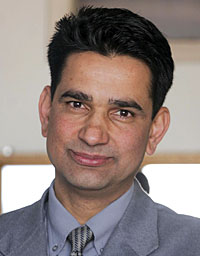 |
To mark the first anniversary of his death the Indra Lohani Memorial Committee this week launched the book Euta Beglai Byaktitwa - Indra Lohani, a compilation of tributes by those who knew the tv talk show host personally and professionally.
The book is a rare glimpse into Lohani's personal life. His mother Hari Maya Lohani describes his childhood, his personality and the pain of his death in poignant poems. In reading Hari Maya Lohani's tribute to her son, we understand what made him the way he was, of his strong convictions and non-chauvinistic nationalism. It is also clear that Lohani's mother is a strong, educated woman who taught Lohani the importance of respecting women and treating them as equals.
Indra Lohani, with his mother and wife Sushma, instilled in their daughters the values of sincerity, charity and education. As we read his daughters' tributes, we understand how close he was to his family, how he loved just being at home and hanging out with his two daughters, inviting friends over and surrounding his house with laughter and conversation.
Lohani was the happiest when he was at home with his family. "Even 15 minutes before his program Bahas was to go live, he would still be playing with us, and we had to literally drag him out of the house to go to the studio," writes Samragi, his ten-year-old daughter.
It is also clear that Lohani was a deeply spiritual man and loved helping the poor. Less than a month before his death, he was visiting his native Jhapa where he had brought herbs from Ilam and Panchthar so that he could start an herb factory there. Hari Maya Lohani says that her son wanted to cultivate Nepali herbs to produce medicine that was easily affordable for the Nepali people.
Lohani had a premonition that he was going to die young. He used to talk about death often, sometimes with his daughters and his wife, as if preparing them for the days when they would have to live without him. He was always very generous, and this value held his family together. Samragi describes her home as a place where no one would be turned away: "Baba once told me: your house is a place where if hungry people come they will never go back without food, if people without clothes come, they will be given warm clothes and if sick people come they will be given medicine."
From his humble beginnings in Gaura Daha, Jhapa to the National Law School in Bangalore, to Kantipur Television, it is evident he was strong-willed and very focused. He was a man of a liberal democratic mindset and a great depth of conviction - of pluralism, democracy and the rule of law. Lohani genuinely believed that it was his duty to help fellow Nepalis - he went beyond the call of duty when he rescued people after the 2008 Kosi floods, and he would talk to his mother often about how he wanted to protect Nepali people from the Himalaya to the Tarai.
Lohani understood the importance of talking about issues that others would want to shove under the rug. Not all would have agreed with the way he ran his show - he probed, he asked hard and direct questions and never let anyone off the hook easily. But he was savvy and was one of the rare hosts who engaged with his guests and got them talking. He took issues head on and had Lohani been alive he would have got lawmakers and the public talking about constitution writing, the rule of law, combatant rehabilitation/integration, accountability and impunity. He has left a void in the lives of Sushma, Samragi and Suhangi, but equally, in the fabric of Nepali society.



